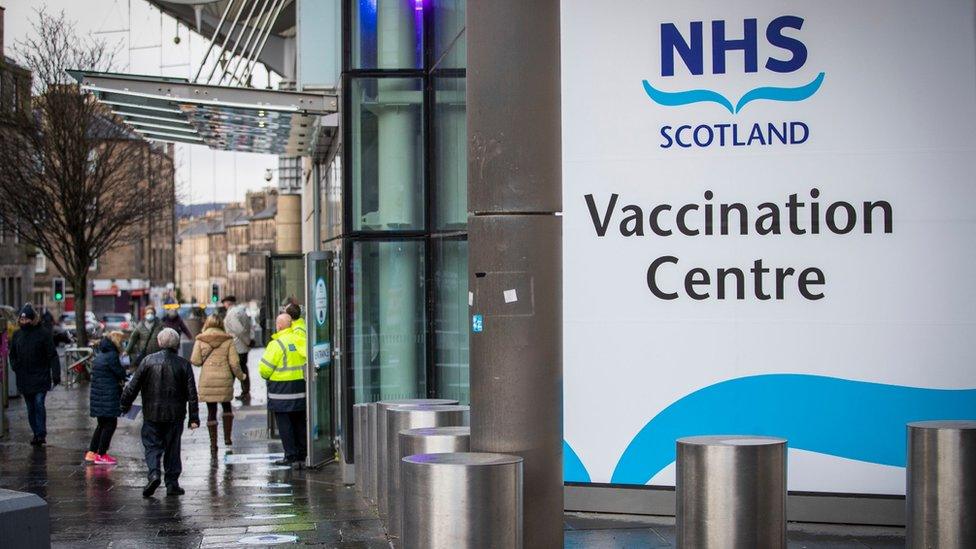Covid in Scotland: Number of new cases highest since February
- Published
Covid in Scotland: Cases 'have tripled in a month'
Scotland has recorded its highest number of new Covid cases since February, a day before restrictions ease across much of the country.
A total of 992 people tested positive for the virus on Thursday, the highest daily figure since 17 February.
First Minister Nicola Sturgeon said the number of new cases had more than tripled in the past month.
And she said it showed that the country was at a "critical juncture" in the pandemic.
However, she stressed that the success of the vaccine programme meant that the country could continue to look forward to living with fewer restrictions over the summer.
And she said the link between the number of cases and the number of people being hospitalised and dying because of the virus was not as strong as it has been in the past - but had not disappeared completely.
Ms Sturgeon said: "We are at a very critical juncture right now in what we still very much hope, and believe, is a transition to a less restrictive way of dealing with Covid, but the position we are in now on that transition is a fragile one."
Many areas in the north and south of mainland Scotland will move from level two to level one of the country's five-tier system from midnight on Friday.
Glasgow will move from level three to level two - allowing people to meet in each other's homes again and drink alcohol inside pubs and restaurants - and island communities including Orkney, Shetland and the Western Isles will move to the lowest level zero restrictions.

More than two million people in Scotland have had both doses of a vaccine
But it was announced earlier this week that 13 council areas with a combined population of 2.3 million people in the central belt of the country, including Edinburgh, would stay in level two rather than moving down to level one as had been planned.
The whole country is currently due to move to level 0 on 28 June - with Ms Sturgeon saying she is still optimistic about that target despite doubts being expressed about whether it will happen.
Scottish Conservatives leader Douglas Ross - who is voluntarily self-isolating despite testing negative for the virus - called for greater clarity from the Scottish government on how areas can move out of level two, saying "we don't need to shut down entire cities if we see a spike in cases".
Instead, he said more targeted measures such as increased testing and vaccination should be put in place when local outbreaks are detected.

The country's national clinical director has warned that Scotland is now in the early stages of a third wave of the virus, with about 70% of new cases thought to be the so-called Delta variant that was first detected in India.
Ms Sturgeon said that this variant appeared to be "quite significantly" more transmissible even than the Kent variant that was dominant earlier in the year, and that early data suggests it may increase the risk of hospitalisation.
She stressed that there were also "strong indications" that vaccines were weakening the link between rising cases and the number of people being hospitalised, needing intensive care treatment and dying.
But she warned that the link had not yet been broken completely, with hospital cases rising to more than 100 in the past week and a small "upward tick" in the number of patients in intensive care in recent days - although the figure remains very low, with only eight people currently being treated in ICU units across the country.
The deaths of a further two people who had tested positive for the virus in the previous 28 days have also been recorded, and new cases of the virus were detected in every council area on Thursday.
The first minister said the figures justified her decision to pause the easing of restrictions in areas of the country where case numbers have been increasing.
She added: "There is still a significant proportion of the country that has not yet had both doses of the vaccine.
"We need to exercise continued care and that is why the decisions I set out on Tuesday, about the level of protection that will apply from tomorrow to different parts of the country, were so cautious.
"I know that is frustrating, but at this particular moment it is necessary in my judgment to be cautious while we continue to vaccinate more and more people."
A total of 3,326,005 people have had at least one dose of the vaccine in Scotland - of whom 2,170,570 have been given a second dose.

